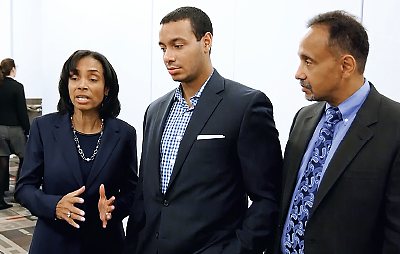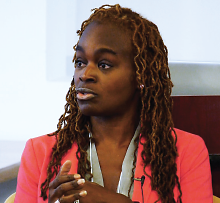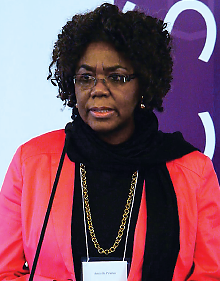Symposium Addresses Mental Health of Ethnic Minority College Students
Abstract
Unaddressed racial discrimination on college campuses may be one predictor of adverse mental health consequences in students.
The challenges associated with excelling academically can be stressful for any college student, but for students of color, particularly at institutions that have a majority white student population, these stresses can be exacerbated, experts suggest.
Last month, the Center for the Study of Race and Ethnicity in America (CSREA) at Brown University held “Young, Gifted, and @ Risk,” a symposium focusing on the mental health of high-achieving college students of color.

Tricia Rose, Ph.D., welcomes guests to the symposium “Young, Gifted, and @ Risk.”
“Race and ethnicity, as well as structural racism and inequality, saturate every aspect of every human being’s life in the United States,” said Tricia Rose, Ph.D., a professor of Africana studies at Brown and director of CSREA, in an interview with Psychiatric News. “Young people of color are particularly at risk—no matter how gifted they may be—for not being understood about these challenges.”
The symposium was sponsored in conjunction with the Stephen C. Rose (SCR) Legacy Fund, a fund commemorating the life of a young African-American graduate of Harvard University who died by suicide on February 6 at age 29. Stephen was a nephew of Tricia Rose.
“Stephen was very intelligent,” Evan Rose, Stephen’s brother, said in addressing the audience. “As an African-American male, he was trying to figure out where he was going in life. … The issues that he dealt with were issues similar to what other gifted African Americans deal with [throughout young adulthood].”

Stephanie Bell-Rose, J.D., M.P.A., and Christopher Rose, Ph.D. (right), are the parents of Stephen Rose, a high-achieving graduate of Harvard University who died by suicide last February. With them are Stephen’s brother, Evan.
After Stephen’s death, the Rose family began to push for more dialogue concerning mental health awareness among young people. “When doing our research on the population of young people who are served and underserved [by mental health services], it was clear that young people of color were very much underserved,” Stephanie Bell-Rose, J.D., M.P.A., mother of Stephen and co-administrator of the SCR Legacy Fund, told Psychiatric News. “When we examined the population more closely, it was clear that young people of color who were high achievers were even more underserved,” making this population vulnerable to adverse mental health consequences.

Alfiee Breland-Noble, Ph.D., M.H.Sc., says that minority students may experience feelings of isolation on college campuses with a majority white student population.
“There is an added pressure of being in the minority, numerically, … which may cause someone to feel isolated,” said Alfiee Breland-Noble, Ph.D., M.H.Sc., a speaker at the meeting and an associate professor of psychiatry at Georgetown University Medical Center. Breland-Noble explained to Psychiatric News that often more pressures can be applied to first-generation minority college students who are striving to become an inspirational figure for younger family members, in addition to fighting racial stereotypes regarding intelligence and overt and covert racism from students, faculty, and the campus administration.
A study published last year in the Journal of Multicultural Counseling and Development showed that of 240 minority college students interviewed at the University of Texas at Austin, African Americans were more likely to report feeling “minority-status stress” (that is, distress caused by discrimination) when compared with other ethnic minority groups, whereas Asian Americans were most likely to report imposter feelings, a psychological phenomenon in which people believe that they do not deserve successes that they have achieved. Both feelings were predictors of psychological distress, with imposter-related ones being the strongest.

Annelle Primm, M.D., M.P.H., discusses her experience as a minority student at an Ivy League institution.
Kevin Cokley, Ph.D., M.Ed., lead author of the study and a professor of psychology at the University of Texas, said that racial stereotypes for intelligence may play a role in both of these situations, with African Americans feeling as though people are expecting them to underachieve, while the expectation for Asian Americans is to achieve or overachieve—causing both minority groups to be singled out. Cokley stressed that there is substantial need for psychological interventions that are specifically targeted to the diverse demands of all ethnic minorities.” APA Deputy Medical Director Annelle Primm, M.D., M.P.H., agreed.
“It’s very important for psychiatrists and other mental health professionals to be cognizant of the experiences of high–achieving ethnic minority students. It’s an aspect of cultural competence,” Primm told Psychiatric News.
Primm, who spoke about being an African-American student at an Ivy League university during the beginning stages of desegregation, said that the symposium exposed realities about issues that many students of color face throughout their academic careers, including isolation, self-doubt, and the feeling of not belonging—all emotions that she acknowledged feeling as a student. With support from family and friends, Primm said she was able to prevail.
Primm said that she is confident that the issues that were addressed at the symposium will have some impact on improving the experiences of high-aspiring students of color and prompt “institutions of higher learning to put measures into place that will be relevant and culturally tailored for students of racially diverse backgrounds to not only attend, but to graduate and achieve success.” ■



